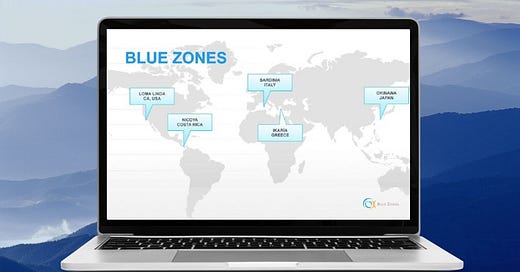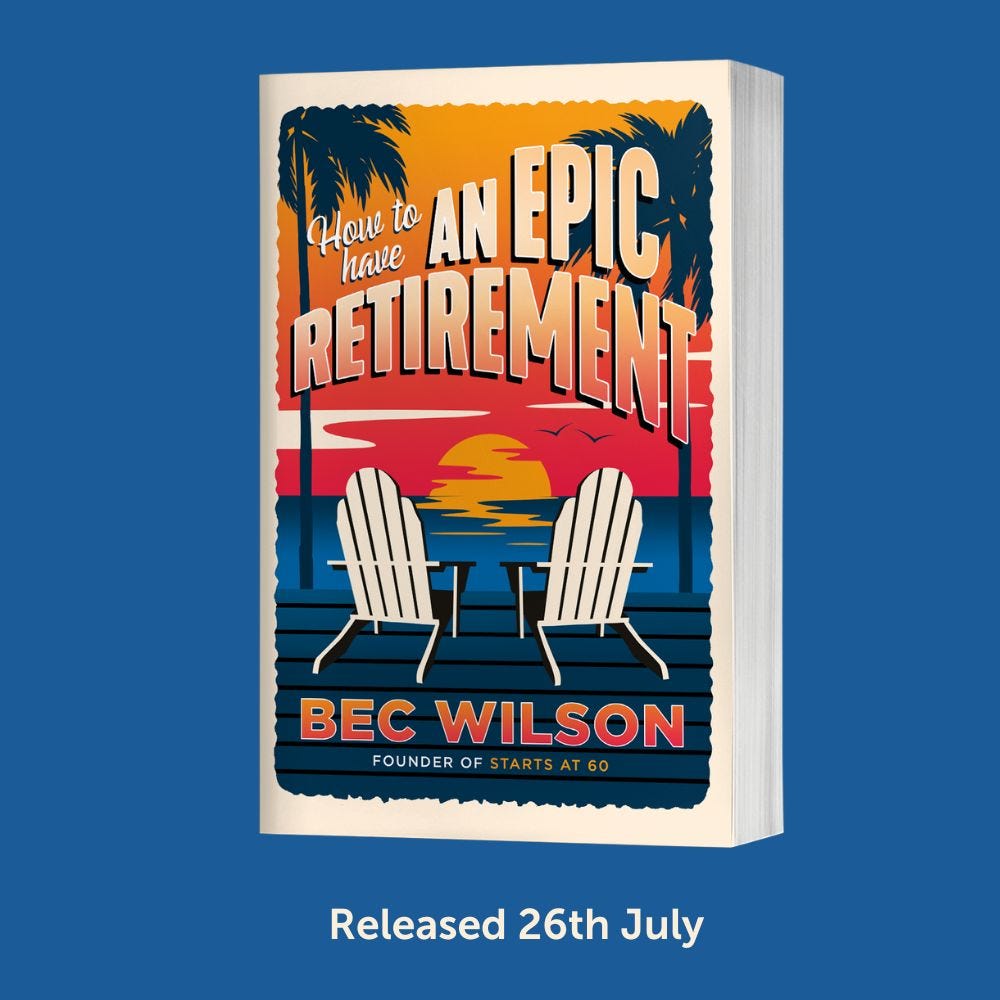The secrets to living a longer, healthier life: Unearthing the wisdom of the Blue Zones and the Okinawans
From communities with the largest numbers of centenarians in the world comes a set of valuable principles to help you live longer.
Today I want to talk about two pieces of remarkable research that have been done around the world on groups of people who are living much longer than most. Each of these studies have looked at the lifestyles and behaviours of specific communities in an attempt to discover the keys to longer, healthier lives. And each have uncovered very similar sets of instructions for the things we should (and shouldn’t) do if we want to live to the ripe old age of 100 or thereabouts. So fasten your seatbelts, as we navigate the fascinating research and timeless principles that may hold the key to your own journey towards an epic, fulfilling retirement.
Herein lies the true essence of vitality and longevity - according to social and health scientists!
The two studies, both of which are worth following are each significant in their own ways. And many in the fields of longevity speak of them as though they are our friends. We refer to them as the Blue Zones and the Okinawans. Let me explain.
The Blue Zones study is a pioneering research project conducted by National Geographic and author Dan Buettner. It identified five regions around the world where people tend to live longer and healthier lives: Okinawa, Japan; Sardinia, Italy; Nicoya, Costa Rica; Ikaria, Greece; and Loma Linda, California. Researchers analysed the lifestyle, diet, and social aspects of these communities to uncover the factors contributing to their longevity. They found commonalities, which we will dig into below, such as plant-based diets, regular physical activity, strong social connections, and a sense of purpose as key elements in promoting longer and healthier lives.
The Okinawa Centenarian Study is a long-term research project funded by the Japan Ministry of Health that focuses on the remarkable longevity observed among the residents of Okinawa, Japan. The study examines the lifestyle and habits of Okinawan centenarians to uncover the factors contributing to their exceptional health and longevity. The big findings include their adherence to a nutrient-dense, plant-based diet, the practice of hara hachi bu (eating until 80% full), regular physical activity through natural movements, strong social connections within close-knit communities, and the emphasis on stress reduction techniques like meditation and mindfulness. And scientists believe that these factors collectively contribute to the extended lifespans and vibrant health observed among the Okinawan population.
So let’s dig into the factors that increase longevity in a deeper way and see if there’s any you can adopt in your lives.
Embrace a balanced and nutrient-dense, primarily plant based diet
Okinawa, the land of centenarians, and the five Blue Zones both have much to teach us about nutrition. Both studies reveal diets that are low in calories but packed with nutrients, antioxidants and fibre. They focus on consuming plant-based foods such as fruits, vegetables, legumes, healthy oils and whole grains. Both embrace lean protein sources like fish and tofu and look to reduce the intake of animal products that are known to increase the risks of chronic diseases. This balanced and nutrient-dense diet is shown to provide our bodies the necessary fuel for both vitality and longevity.
Practise mindful eating or ‘hara hachi bu’
A crucial aspect of the Blue Zones and Okinawan lifestyle is the practice of mindful eating. Rather than rushing through meals, they engage in slow, deliberate eating, savouring each bite and paying attention to the body's cues of hunger and satiety. In Okinawa they practise something they call “hara hachi bu” which means eating until you are 80 percent full. This practice helps prevent overeating and promotes better digestion. And by cultivating a deeper connection with the food they consume, it is said that they foster a greater appreciation for nourishment and make conscious choices that support their long-term well-being.
Stay physically active
Both the Okinawans and the Blue Zones are communities where activity is boiled into everyday life rather than done as structured exercise for a targeted period of time. They engage in regular low intensity exercise like walking, because most people walk around their communities. They participate actively in gardening and food growing, providing incidental activities in their days, and they have a deep engagement with traditional martial arts. And each of these activities promotes muscle strength, cardiovascular health, balance and mobility. When we incorporate regular exercise into our daily routine, we can improve our physical fitness, prevent age-related diseases, and enhance our longevity, even if we do so in a less grass-roots manner.
Drink wine at 5
This is one that will bring many smiles. People in all Blue Zones (except the Adventists) drink alcohol moderately and regularly. Moderate drinkers outlive nondrinkers in these areas. The trick is to drink one to two glasses per day with friends and/or with food. And no, you cannot save up all week and have 14 drinks on Saturday.
Put your loved ones first
A very important message for those in the hardest working stage of their careers. Successful centenarians in the Blue Zones put their families first. This means keeping ageing parents and grandparents nearby or in their family home. They commit to a life partner (which according to the science can add up to 3 years of life expectancy to each life) and they invest in their children with time, care and love. In the Blue Zones they will be more likely to care for aging parents when the time comes in their ageing process too.
Cultivate strong social connections and moais
Let's talk about the power of connection. Blue Zones and Okinawans teach us that building strong social bonds is the key to a long and happy life. They often live within small communities, with multi-generational families nearby.
The world’s longest lived people have their own social circles that support their very healthy behaviours, Okinawans live in “moais” which are groups of 5 friends that committed to each other for life and live together or nearby. Sometimes you are born into them. And some of the wider research in this space shows that smoking, obesity, happiness, and even loneliness can be contagious - so we need to shape our healthy behaviours and reduce exposure to unhealthy ones so the contagion is positive in our lives.
In both Blue Zones and Okinawan communities they intensely value relationships and friendships and spend time gathering. It’s a firm message that you should lean into your family, friends, and community for support and love in the second half of life and find ways to have regular social interactions that uplift your spirit and reduce stress. Being part of something bigger gives you purpose and a sense of belonging. So, let's cherish those relationships, nurture them with care, and create a vibrant network that will accompany us on our epic journey. It contributes enormously to our overall well-being and longevity.
Prioritise stress reduction and mindfulness
Take a deep breath and truly find ways to reduce the stress in your life! Stress leads to chronic inflammation, associated with every major age-related disease.
Both the residents of Blue Zones and the Okinawans have found ways to manage stress. They swear by meditation, yoga, tai chi and connecting with nature to tame stress levels. And as simple communities, often outside of the urban lifestyles we are so familiar with, it is easy for them to stay grounded. These techniques help them manage stress, cultivate inner peace, and promote emotional well-being. The big messages is to make space for self-care, prioritise relaxation, and make stress reduction a top priority in your daily life. Take the simple paths. The scientists promise that a calm and serene mindset is one of the big secret ingredients for a long and healthy journey through life with less chronic disease.
The Blue Zones studies and the the Okinawan Centenarian Study are both fascinating sources for how we can adapt our western lives to live more simply and benefit through longevity - if we’re brave and able. And that longevity and longer healthspan will undoubtedly help you as you seek your epic retirement.
Keep reading - there’s heaps to explore below this week. And until Friday when my new podcast arrives for the weekend - make it epic!
Bec Wilson Xx
Where the Aussie Dollar is telling us to travel this year
This column appeared in both print and digital in the Sun Herald and Sunday Age. You can read it here.
Almost every economist agrees, the Australian dollar has a tough six months ahead, and for hungry travellers keen to take on the world while their mortgage rates are rising, every dollar counts.
So if you’re committed to travelling, but you want to get maximum bang for your Aussie bucks, where do you travel to? Let’s look ahead at what the predictions for interest rates and the Australian dollar tell us about where your dollar will go further this year and early next.
Read more on The Sydney Morning Herald website here.
New Retirement Diaries Podcast launched on Friday
Why wait any longer to start telling the stories of epic retirees, part time retirees and those helping them navigate. Each week I’ll be talking to a broad and very diverse selection of interesting people. Mike Chesworth was a great person to start with. He retired six years ago from a huge role as the General Manager of Financial Planning and Advice for Westpac and BT. And since then he's been building what sounds like a truly epic retirement. I hope you enjoy the ideas and learnings Mike’s built up along the way.
New 'Retirement Diaries' podcast: Mike Chesworth on transitioning from a big career, travelling with the blokes and gravel biking
Listen now (26 min) | Here’s something a little different for you to enjoy this weekend. Our growing Epic Retirement community has been asking me to tell real stories of retirees living out their epic retirement and learning lessons along the way. So today I’m kicking off a casual, relaxed and conversational podcast which will be made up of short, interesting conversations …
This week in social and media
Instagram is my favourite channel on social media. Pop on over and follow me on Insta for regular inspiring light bites.
This week in social and media there’s plenty going on.
More magnesium in our diet leads to better brain health as we age. But how much do we need? - new scientific data Take a look at our detailed Instagram post.
Listen to Bec Wilson on 2GB Afternoons with Deb Knight talking about how you can get maximum bang for your Aussie Dollar on the holidays you choose this year. Listen here.
Want to know where others are volunteering and working for not for profits? We asked our Facebook Group to inspire us. Join the conversation here.
Help us spread the word about Epic Retirement
Sharing really is caring! I ask you to share my weekly (How to have an) Epic Retirement Newsletter with some of your friends today and help them learn and live longer, healthier and better quality lives - it’s my goal to help you and there’s a lot of people out there right now who need a little more assistance and peerage on the journey into retirement, whether that be in the areas of financial, health, happiness and fulfilment or navigating your next steps for your home. Please, pass it on.
How to Have an Epic Retirement is now available for pre-order
We’re counting down to the in-store release - just over a month to go. But if you pre-order you’ll get it as soon as we do. Check out the new updated cover now it is all off to print.
This really is the ultimate guidebook for a modern retirement.
How to Have an Epic Retirement is filled with practical information, examples and questions covering the six key pillars of great modern retirement:
Time
Building your financial confidence
Looking after your health
Understanding how happiness is created and finding fulfilment
Living out your travel dreams
Your home and how your needs change in all the different phases of retirement
It’s the first book of its kind to explain in detail how the systems that support a new age and modern retirement in Australia work, making what can be a complex topic seem easy to navigate.
How to Have an Epic Retirement is written for you, Australia’s truly epic pre- and post retirees – so secure your copy using the pre-order discount below.
Great reads from around the web this week
Ageing is a roller coaster - enjoy the ride while you can, Sydney Morning Herald, Tony Wright, read here
How to tackle distributions with a $3M super fund, Australian Financial Review, John Wasiliev, read here









